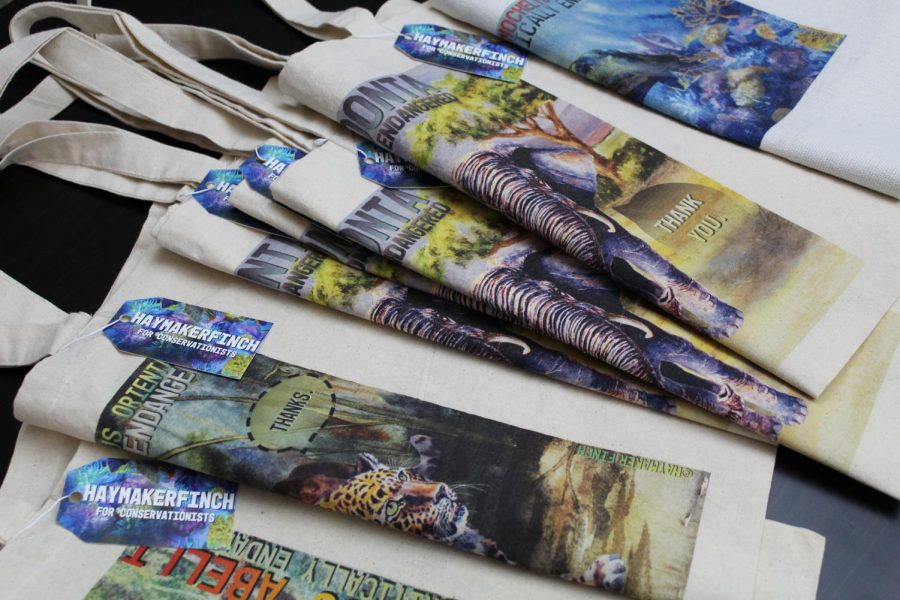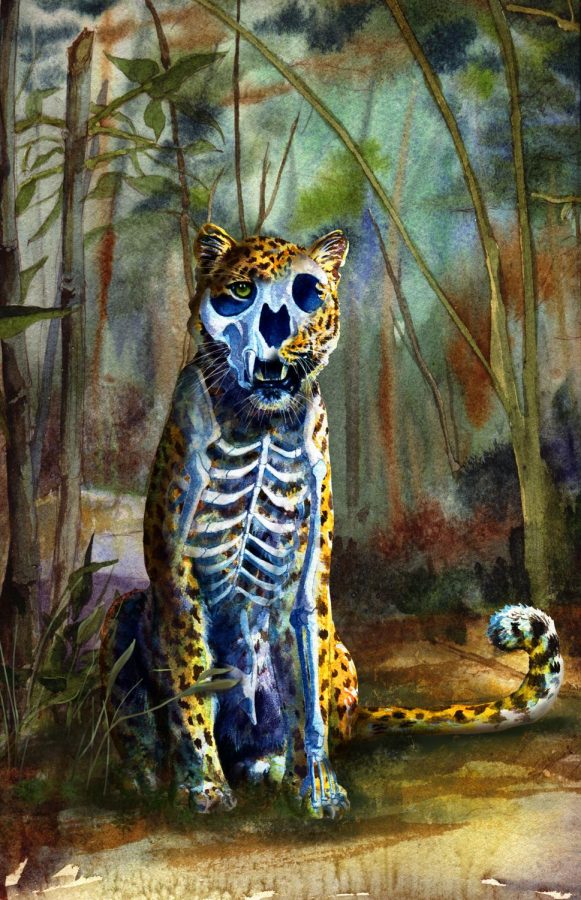Sac State alumna launches Black-owned apparel brand for conservationists
Audrey Simpson offers products with a clear message
Several of the book totes featuring critically endangered species offered by Sac State alumna Audrey Simpson through Haymaker Finch. Simpson launched her apparel brand earlier this month. Photo courtesy of Audrey Simpson
April 4, 2020
Earlier this month, Sacramento State alumna Audrey Simpson launched a conservation-focused apparel brand named Haymaker Finch, based in Oakland.
Simpson’s mission is to offer apparel that spreads the message of conservation and educates others to help them change their daily habits. She wants people to take action to help save vulnerable populations and recognize that some of their day-to-day efforts, such as bringing their own bags to the grocery store or using reusable water bottles, are conservation.
“What I’m trying to do is make everybody realize it’s simple to be a conservationist,” said Simpson.
Currently, Haymaker Finch offers a series of book totes featuring several critically endangered species, including the Sumatran orangutan, the Hawksbill sea turtle, the African elephant and the Amur leopard. Simpson works with science illustrator Martha Iserman for the watercolor paintings featured on the products.
“I just think it’s a clear, very simple and very important message of reminding everybody of who we share this world with,” said Iserman.
Simpson said she had already been selling the products to people around her before officially launching. Now, she wants people to be able to clearly visualize the metaphor in the name Haymaker Finch.
“If you just imagine in your mind, hitting a finch with a haymaker, I think that is a metaphor for what we as a human population are doing to the environment,” said Simpson.
Story continues below photo gallery
Haymaker Finch also has a newsletter that provides information on new releases and conservation efforts that it hopes will help people understand exactly why they should be concerned about the endangered species, according to Simpson.
Simpson hopes to partner with conservationist organizations and donate 5% of purchases to help fund those organizations’ projects.
Simpson currently works with a small team including her sister, Iserman and other people close to her who help when they can. She wants the endeavor to be self-financed and to avoid waste, so they only produce small batches of their product. Simpson said she is facing the challenge of scaling without a lot of financing as well as the struggle of reaching a wider audience.
Simpson also said she recognizes a challenge of succeeding as a Black-owned business. While earning her MBA at Mills College, she said she realized that a lot of the businesses around her were not Black-owned.
“I’m struggling a little bit with how I want to move forward, because I know that there is already this giant obstacle I’ll have to overcome simply by being a Black business owner,” said Simpson.
Simpson said she won’t let the challenge deter her and hopes that culture will help push her forward.
“It’s something that I’m constantly thinking about, but at the same time I know that Black people and Black trends have always been very prevalent in our culture,” said Simpson.
During her time at Sac State from 2010 to 2013, Simpson studied international relations and had a minor in peace and conflict resolution studies. Her intent was to pursue a career in microfinance to work with poverty alleviation.
She also served as the treasurer for a Peace and Conflict Club and took part in the Model United Nations Program. She said her work for Model U. N. was her favorite experience at Sac State. She and a partner would prepare resolutions throughout the year to represent a particular country in a conference, and they would try to get those resolutions passed.
“It was everything I wanted to do in the real world in a condensed experience,” said Simpson.
However, Simpson struggled to find a job in microfinance and ended up joining AmeriCorps, helping marginalized students at Oak Ridge Elementary School in Sacramento understand the significance of education.
Following this, Simpson bounced around jobs until she started working in retail. She now works as an inventory planner for The Gap Inc., forecasting sales and then buying inventory. Simpson said her passion was reignited while she worked through her MBA and was able to take a class on entrepreneurship.
“I thought that I might want to combine entrepreneurship with my passion for poverty alleviation, conserving the world and the most vulnerable populations,” said Simpson.
She reached out to Iserman, who lives in Australia, online. When they spoke for the first time about Simpson’s idea for an apparel brand with a conservationist message, Iserman said she could tell Simpson’s motivations and passion were in the right place. As a science illustrator, Iserman connected with the message behind the brand.
“The conservation theme and the conservation inspiration behind the whole thing spoke to me a lot,” said Iserman.
Although Simpson and Iserman have never met in person, they both said they have had no trouble communicating or working with each other. They set up a phone call every week to talk about Haymaker Finch and they work together through Google Drive.
Simpson said they are planning on expanding to t-shirts in the near future, as well as sweatshirts and embroidered products.
“I feel like, since I’ve worked in retail for quite a while now, I truly understand the impact of apparel on people’s lives,” Simpson said.


































































































































